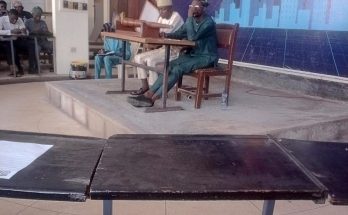By: William Olaleye
One issue that has for sessions and years posed as an uphill battle for the UI’SU, has been the regulation of transportation fares for intra-campus transit. More times than not, it appears that the student union have lost battles, with students having to bear the consequences of these losses, either by paying fares officially set by the union, or by paying unofficial fares caused by the union’s failure to monitor set prices.
In recent times, the drastic shift in Nigeria’s economic climate has led to sporadic changes in how much transporters charge for different locations within the University of Ibadan. For instance, as of June 27th, 2021, tricycle riders were required to charge 30 naira per passenger for three passengers, with 50 naira being the maximum, and 100 naira for a drop. Cab drivers operated under the same pricing system, except that they could charge 150 naira for a drop.
However, this pricing did not remain for long. Today, the minimum transport fare in UI is 100 naira. Car drops cost 600 naira for two passengers and 500 naira for one passenger in tricycles. Unfortunately, despite the worsening economic situation, transport operators still manipulate prices, charging students more than the listed fare, even though a price chart hangs clearly at the Gate Park.
A concerned student informed me that cab drivers were charging 50 naira more than the designated fare from the Gate to the SUB park. So, I embarked on a journey around campus, boarding various cabs and tricycles to understand the discrepancy. The first cab driver I met was stationed at Education. He seemed to have been there for a while. When I asked about the official price list at Gate Park, he was very forthcoming. He explained that the listed fares did not always determine what students were charged.
“Most of the time, whether keke or cab, we do consider,” he said. “Even from Arts, that is 150, some of us can take 100 Naira, it depends on the student’s approach, most of the time.” However, he affirmed that “their fixed price is the fixed price, it’s the normal price.” He also noted that he could review the price for any student who treated him respectfully.
For some students, boarding a tricycle might not always be convenient, especially since they might have to wait for minutes for others heading in their direction before their trip can commence. For this reason, said student might decide to take a cab. However, boarding a cab to places like the SUB means that the student would have to pay an extra #50. This surcharge did not just start this session, and like previous times, there have been no consequences in sight for the defaulters. This raises the question: Are cab drivers subject to the same price regulations as tricycle riders?
For the sake of this report, I boarded two cabs from the Gate to the SUB and was charged 150 Naira, while tricycle riders charged only 100 Naira. The first cab I boarded to SUB was going to Science/Zoo/ Law, while the second cab was headed for Zik/Bello/Indy; they both went through SUB.
One cab driver who took me to Awolowo Hall from the Gate admitted that they were also subject to the price regulations made by the union, and they charged the same price as the tricycle drivers did. However, he mentioned that they charged more when going to or from the SUB, but he did not give reasons for the increase.
Speaking to a tricycle rider, he stated that cab drivers were not subject to any price regulation, while another insisted that “the pricing list (released by the student union executives)is for both of them.
Commuting to various places on campus, using different means of transportation, I discovered that tricycle riders seemed more likely to adhere to the price regulation than cab drivers. It is frustrating for students, already juggling schoolwork, social activities, registration, general studies, and everything in between, to endure the self-serving imposition of increased fares by cab drivers.
Speaking to the House Secretary of the UI’SU, Mr. Adeyemi Oluwaseun, he clarified that the price list displayed at the Gate applies to both cab drivers and tricycle riders. “It applies to both cab men and keke,” he said. After bringing to his attention the fact that most cab drivers charged an extra 50 Naira to bring commuters to SUB, he confirmed that the fare should only be 100 Naira and stated that defaulters should be reported so that disciplinary action can be taken.
“It should be 100 naira. Any cab man that takes 150 should have his sticker snapped and be reported to us,” he said.
He also mentioned a previous incident where a student couldn’t provide photo evidence of the cab sticker, but he still informed the transporters’ chairman, who assured that any cab driver caught overcharging would be made to refund the payment and would not be allowed to work for the day. “I told their chairman, and he said anyone caught would refund the money and won’t work that day,” said the Secretary.
When asked about steps the SU has taken to curb the excesses of cab drivers, Mr. Seun revealed the existence of a committee responsible for such issues. “We have a (transport) committee. Whenever we hear reports of extortion or disorderliness, our committee members go to the spot immediately. They are very prompt in addressing issues,” he said.
He also noted that the transporters have a task force that imposes fines for various misdemeanours, such as choosing passengers selectively or violating traffic rules on campus. When asked if the committee only took steps to monitor the transporters’ activities after a report had been made, he stated that he sometimes went undercover to find any inconsistencies and observe the procedures. “There are times that I’ll just blend in with customers to cue in, to observe the procedures and how the people operate. Whenever I notice any inappropriate behaviour, I’ll take the necessary actions” he said.
It is important to note that apart from simply announcing the price list or hanging up a banner, strict monitoring should be in place to ensure that the price list is adhered to, as this is a vital part of regulating the transport fare. Additionally, students are always encouraged to report any noticed infringement to the relevant channels. Some may argue that the absence of a good monitoring structure has caused many transporters to, in one way or another, ignore any price list proposed by the Student Union, but efforts can still be made to completely rein in the menace.



